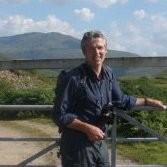
In this new regular feature we offer the opportunity to landscape ecologists to share what their working life looks like. We hope that over time the articles about landscape ecology careers will provide a rich portfolio encouraging people to consider careers in landscape ecology. IALE UK committee member Geoff Griffiths kindly gets us started.
What (or who) got you involved in landscape ecology?
The late Professor Bob Bunce. I was seconded in 1990 to the National Remote Sensing Centre in Farnborough, Hampshire, by my then employer, Hunting Surveys & Consultants. We were awarded part of a MAFF (now Defra) funded project in collaboration with the Institute of Terrestrial Ecology (ITE) (now Centre for Ecology & Hydrology), led by Bob at the Merlewood, Research Centre, Grange-over-Sands in Cumbria. My role in the project (ECOLUC, Ecological Consequences of Land Use Change) was to develop indices of spatial patterns from land cover maps derived from satellite imagery within Countryside Survey 1km squares, at sites in the northern Pennines and southern Scotland. This was before the days of Fragstats and my understanding of GIS was rudimentary, but an interesting and rewarding introduction to landscape ecology in a wonderful part of the world working with an appreciative team led by Bob.
What caught your interest in landscape ecology?
Maps and satellites! My very first professional job post-PhD involved being sent out to buy Keswick pencils to colour maps of the Cotswolds from images obtained by the Daedalus Airborne Multispectral Scanner - 2 weeks of map colouring was not what I had expected! This interest in maps continued with a PhD at the University of Aston using the fast-developing technology of earth observation from satellites on a topic to monitor desertification in northern Kenya. I ordered 70mm black & white film positives from the EROS Data Centre in Sioux Falls, one for each spectral channel of the early Landsat MSS (multispectral scanner) sensor and produced colour composite images in the Geography Department at the University of Reading using an instrument called a colour additive viewer – primitive by modern standards but effective.
How long have you been working in landscape ecology?
A long time, almost 30 years, but really since joining the Department of Geography at the University of Reading in 1995. Apart from undergraduate teaching in biogeography, landscape ecology and GIS, I supervised over 20 PhD students most of whom were working on topics with at least some landscape ecology. As a former secretary and chair of ialeUK, this interest was constantly renewed at meetings and conferences organised by iale over the years.
What are you working on at the moment, and where?
Despite retiring from undergraduate teaching in 2018, I haven’t quite retired! A project in Ghana, Zambia and Ethiopia led by IIED in London to explore the impact of agricultural expansion on biodiversity, is only just finishing. With my long-term friend and colleague, Steven Warnock, we are working on a project for the Brecon Beacons National Park Authority to develop indices of the ecological/cultural condition of landscape units across the Park. Perhaps the project that takes up most of my time at the moment is developing a local nature recovery plan where I live in West Oxfordshire. It is pure landscape ecology and rewarding to see things happening on the ground, but working with volunteers and local authorities comes with its own challenges!
What do you most enjoy about you work, on a day-to-day basis?
I have always enjoyed the teaching element of the job, especially supervising PhD students and, more recently, running training courses in landscape ecology/GIS for natural resource management in Africa (Liberia, Cameroun ) and the Far East (Vietnam, Laos). On a day-to-day basis, it’s the variety of the work and meeting people but I still get a thrill from colouring maps (no longer from Keswick pencils, sadly) and the fieldwork, when I get the chance.
Which of your projects/papers has had the most impact, and why?
Difficult! Recent work on participatory land use planning in sub-Saharan Africa has been significant in the sense that the approach is a potential template for what we have to do globally; work through the complex trade-offs between agriculture and biodiversity at a time of rapid climate change and food insecurity.
What do you regret?
Not establishing a Masters in landscape ecology at Reading.
What would you not say as a landscape ecologist?
Your patch is not a patch on mine! Terrible!
Geoff Griffiths
March 2023